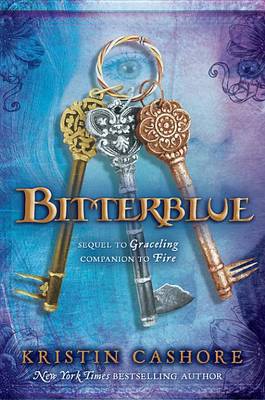
Briana @ Pages Unbound
Written on Jul 14, 2012
This review is also posted at Pages Unbound Book Reviews.
Cashore continues her streak of writing marvelous, imaginative, and character-driven fantasy in her third Graceling book. This one features Bitterblue, about eighteen now and queen of Monsea. Of course, she has been queen of Monsea for years (she announced the fact herself after her father’s death), but the story reveals that she is still learning her way around the job. Her uncle and her advisors have been handling much of the kingdom’s business for years, and she is looking to learn more about the people and take on a greater responsibility for herself. The combination of her youth and feelings of inadequacy combined with her heart and strength make her a realistic and compelling character. Here is a teenager who can rule but knows she still has much to learn.
Cashore has once again put all her effort into creating Bitterblue as an individual. Though her thoughts are suitably progressive, Bitterblue is neither Katsa nor Fire when it comes to relationships. She is a little more mellow than the two, but still has enough iron to make her admirable and a convincing queen. Of course she has her own habits and mannerism, too. The only fault is that sometimes one is tempted to think, “Oh, look! One of Bitterblue’s mannerisms that establish her as a character with a unique personality!” So although Cashore is paying extreme attention to detail, it is possible some of those details could be better integrated.
As promised, Katsa and Po return in this novel, and it is quite interesting to see them years later. It is the sensation one gets seeing Tamora Pierce’s Alanna appear in the Protector of the Small quartet—grown-up and different but still very much the same. Other wonderful characters also make guest appearances.
Parts of the plot are nothing new to fantasy fans. The story opens with Bitterblue’s sneaking out into her own city disguised as a commoner so she can learn more about her people and the state of the land. Yeah…we’ve all seen that before. However, Cashore makes it work, and it certainly is not the overriding point of the book. In fact, the plot is so convoluted that most of it is wildly unpredictable. Only at the very end does it begin to make some sort of sense, though the degree to which it is satisfying in its logic is debatable.
Readers should be warned that much of Bitterblue’s job entails unraveling what her father King Leck did before her—and readers of Graceling will know that King Leck was a sadistic man. Bitterblue is not recommended for the faint of heart. There is a fairly wide difference between suspecting what Leck was doing and having the facts of it described. The effects of his actions are almost as catastrophic, and in many ways Bitterblue is an issues book confronting how his subjects cope with the violence and lies he inflicted on them.
On happier note, there is a touch of romance to give light to the book—not as much or as strong as in Cashore’s previous work, but very fitting to the story. There is also some interesting subtext which doubtless falls under the category of questions Cashore will not answer, but it begs to be interpreted happily.
An incredibly solid and magical work, and a worthy addition to the series.




